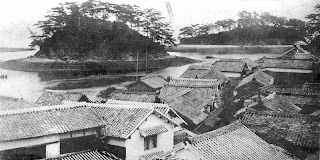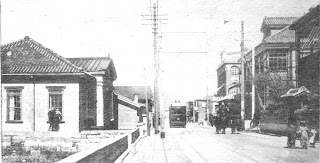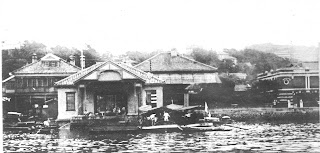The pilgrim blew into this well-known sea-side resort this evening, after an interesting and, towards the end, a somewhat exciting trip. A start was made from Nagasaki at noon and after a short run through the town, the rickshaws took a sharp turn to the right and a steady, uphill climb followed, until an altitude was reached from where a fine panoramic view of the town and harbour was obtained.
Nagasaki Harbour
Progress was good but as the day was warm and there remained a considerable amount of up-hill work to be done; to ease the strain on the motors, additional man-power was switched on to each ricksha by engaging a "pusher," who later on acted as a retarder on the run down hill to Mogi, after reaching the crest of the hill.
Many years had elapsed since the pilgrim last passed this way but the general topography appeared to be unchanged, although the road was certainly in a much better condition.
Bamboo Grove on the Way to Mogi
The same sharp turns and "hairpin loops" were encountered on the downhill portion of the journey, some of these ticklish places being negotiated on one wheel and ere the pilgrim's hair had time to revert to the normal again from the perpendicular, the off wheel would be skirting the edge of a ravine with a safety margin of a couple of inches.
Tagami Mogi, Nagasaki
Several parties travelling by basha, were overtaken and passed with such close shaves that the only thing to do, after letting out a yell of "abunai!" was to shut one's eyes, sit tight and hope for the best.
However, the joss held good and there were no casualties to report when, a couple of hours later, the Pilgrim & Co., Ltd. rolled into Mogi.
Pier of Mogi, Nagasaki
The local basha (omnibus) is a sort of glorified bathing machine on four wheels, drawn by a pair of sturdy horses. The wheels are of a very substantial construction, with broad and thick iron tyres. Some years ago, a cheap and popular cure in vogue with the "liver brigade" at Shanghai was an early morning trip in a ricksha along the French Bund.
This was previous to the introduction of pneumatic tyred rickshaws and the "cure" was said to be efficacious. Travelling by basha would seem to be a variation of this treatment raised to the n'th degree.
Involuntary Philantrophy
At Mogi, after procuring the necessary steamer tickets, the party set out for the "Saikanai Maru.” This triumph of naval architecture was discovered to be a small, wooden steamer of some sixty tons, which lay moored at the end of a stone jetty, access to same being obtained by the passage through a turnstyle, after payment for that privelege.
In order to prevent any possible misconceptions as to the raison d'être of this gate-house and to dissipate any notions that it might be either a refreshment bar or a rest-house, the following legend was displayed promiently across the facade:
"IF YOU PASS THIS JETTY YOU WANT TO PAY 4 SEN."
Presumably, mental telepathy and thought-reading is a strong point about this jetty outfit. Just the same although as a jetty, it was all that might be desired, the pilgrim experienced no bursting desire to shell out four sen to any one. This was gently intimated to the toll-collector but the latter, while interested, intimated that there was nothing doing and a couple of sharp blasts on the steamer's whistle indicated the impatience of her skipper to depart and so put the cloture on the debate.
Wakanagawa, Mogi
Apart from the crank, top-heavy condition of the steamer and the dangerous practice of leaving open (for ventilation) the large cargo-ports, the trip from Mogi to Obama, given fine weather, is a pleasant one.
Mogi
It is remarkable that the Authorities do not take action for the safety of the vessel and her passengers, by insisting that the cargo-ports be closed and secured ere the vessel leaves the wharf. They have had one "regrettable incident" already due to this reprehensible practice, on the Mogi Obama service, an incident which entailed the loss of the vessel with many lives.
The scenery throughout the trip is picturesque, the vessel cruising along the land and poking into numerous small inlets or stopping off small villages, for passengers and freight, which are discharged into, or brought off in small boats. Round the base of wooded hills and small islets, up little fjiords at the head of which picturesqus fishing village nestle and, altogether (cargo-port thrills included) the passenger gets full value for his money. The sea, fortunately for the voyageurs in this cranky and ill-laden tub, was smooth and of a real Bay of Naples blue.
The "Saikanai Maru''
It was fully half an hour after leaving Mogi before the discovery, was made that the four large ports remained open; that there was barely a foot of free-board above their lower edges and also, that there was no intention of closing them.
Obama and Saikanai Maru
The manner in which the boat, her stability still further affected by the deck-load carried, heeled over with the use of the helm and the sickening, momentary pause ere she began to right herself again; was certainly not at all assuring, when one thought of the number of women and children on board and observed that "boats for all" formed no part of the company's business methods.
It was realised that it only required a sharp squall, down the side of one of the hills, to strike the vessel abeam, for the "Saikanai Maru" to provide all the local colour for a first class "go-down.” Acting upon the principle of "being prepared," the pilgrim, loosened his shoes, wound up his watch and wondered whether his Insurance policy covered such risks as the "Saikanai" or classed it as suicide.
These cheerful musings were interrupted by a visit from the purser and such a purser. This youth of some fourteen summers, apparently tripled the parts of purser, fireman's cook and general utility loblollyboy. Presenting a somewhat insanitary-looking book to each passenger, he desired from same an autobiographical sketch of their respective careers, together with a lot of intimate and interesting information respecting their forbears, as provided for in columns ruled off for that purpose.
Unzen Dakii
This book was a mine of interesting information; a volume apparently, of some value, as an offer to purchase same for five yen was declined, said offer inducing the purser to hold on to one corner of the precious volume while the pilgrim was writing his little romance therein.
From these simple annals, quite a number of the more or less important and prominent persons seem to have passed this way, among whom, subsequent voyagers may discern the pilgrim. described as a "brass-finisher" in the column headed "occupation”.
To those who may be inclined to cavil at this description, it may be as well to point out that even the "blokes from Bagdhad" cannot roam around Japan for several months without 'finishing' quite a respectable amount of 'brass.'
Two hours out and weird and horrible noises were heard, issuing from the open skylight of the saloon, noises suggestive of an acute attack of "tummy ache" or of approaching dissolution. The pilgrim was on the point of getting out his bottle of chlorodyne and rendering, either first aid, or easing the passage of the departing, when the accompanying tootling on a flute proclaimed the fact that it was merely a gentleman of the country pouring out his soul in song.
At Chijiwa the first ground swell is felt and as here the steamer hauls across for Obama, over which the Peak of Unzen is seen, standing out clear in a cloudless sky, the swell is thus brought right abeam.
Chijiwa
The "Saikanai Maru" rolls heavily but as by this time, most of the deck cargo has been discharged, there is more "lift" in her motion and beyond the risk of flooding through the cargo-ports, there was little cause for alarm, so much so indeed, that in order to drown the wails, with flute obligato, which were still issuing from below, the pilgrim struck up the chorus of that old-time ditty :—" Oh Joe, the boat's a-goin' over," until requested to desist.
Disembarking at Obama was a scandal. The steamer anchored a short distance away from the sea wall from which an iron ladder led down to the water's edge. There was no handrail and the steps were wet and slippery and the disembarking passengers were packed like sardines in the one sampan provided for the purpose. But the good Joss still kept his weather eye lifting and there were no untoward incidents. Once safely landed ashore, the pilgrim shook his fist at the departing "Saikanai" with a fervent "never again!" and set out for Yanagawa Hotel, a comfortable Japanese caravansary, tariff, 65 sen per diem and find your own chow.





























_edited-1-1.jpg)
_edited-1.jpg) Drydock
Drydock_edited-1-1.jpg)
_edited-1-1.jpg)
_edited-1-1.jpg)
_edited-1-1.jpg)
_edited-1-1.jpg)
 Nagasaki Customs and Oura-machi
Nagasaki Customs and Oura-machi 


+(2)_edited-1.jpg) Picture of Shanghai 1917
Picture of Shanghai 1917_edited-1.jpg)
+(7)_edited-1.jpg)


